
County Dublin is a county in Ireland, and holds its capital city, Dublin. It is located on the island's east coast, within the province of Leinster. Until 1994, County Dublin was a single local government area; in that year, the county council was divided into three new administrative counties: Dún Laoghaire–Rathdown, Fingal and South Dublin. The three administrative counties together with Dublin City proper form a NUTS III statistical region of Ireland. County Dublin remains a single administrative unit for the purposes of the courts and Dublin County combined with Dublin City forms the Judicial County of Dublin, including Dublin Circuit Court, the Dublin County Registrar and the Dublin Metropolitan District Court). Dublin also sees law enforcement and fire services administered county-wide.

Dublin is the capital of Ireland. On a bay at the mouth of the River Liffey, it is in the province of Leinster, bordered on the south by the Dublin Mountains, a part of the Wicklow Mountains range. At the 2022 census, the city council area had a population of 592,713, while Dublin City and its suburbs had a population of 1,263,219, and County Dublin had a population of 1,501,500, making it the largest city by size on the island of Ireland.
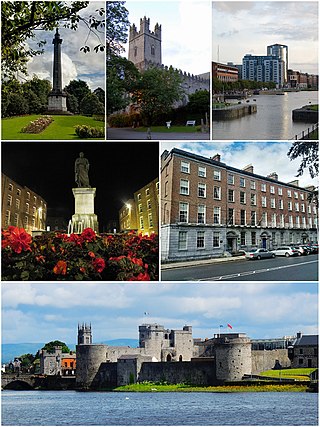
Limerick is a city in western Ireland, in County Limerick. It is in the province of Munster and is in the Mid-West which comprises part of the Southern Region. With a population of 102,287 at the 2022 census, Limerick is the third-most populous urban area in Ireland, and the fourth-most populous city on the island of Ireland. It was founded by Scandinavian settlers in 812, during the Viking Age.
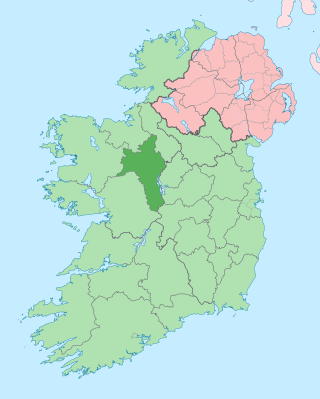
County Roscommon is a county in Ireland. It is part of the province of Connacht and the Northern and Western Region. It is the 11th largest Irish county by area and 26th most populous. Its county town and largest town is Roscommon. Roscommon County Council is the local authority for the county. The population of the county was 69,995 as of the 2022 census.
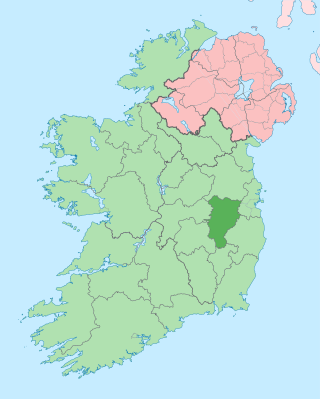
County Kildare is a county in Ireland. It is in the province of Leinster and is part of the Eastern and Midland Region. It is named after the town of Kildare. Kildare County Council is the local authority for the county, which had a population of 246,977 at the 2022 census.

Trinity College Dublin, officially The College of the Holy and Undivided Trinity of Queen Elizabeth near Dublin, is the sole constituent college of the University of Dublin, Ireland. Founded in early 1592 by Queen Elizabeth I who issued a royal charter, it is Ireland's oldest university and was modelled after the collegiate universities of both Oxford and Cambridge. The terms "Trinity College" and "University of Dublin" are synonymous for administrative purposes, as only one such college was ever established.

The Queen's University of Belfast, commonly known as Queen's University Belfast, is a public research university in Belfast, Northern Ireland, United Kingdom. The university received its charter in 1845 as "Queen's College, Belfast", and opened four years later.

The Department for Culture, Media and Sport (DCMS) is a ministerial department of the Government of the United Kingdom. It holds the responsibility for culture and sport in England, and some aspects of the media throughout the UK, such as broadcasting. Its main offices are at 100 Parliament Street, occupying part of the building known as Government Offices Great George Street.

Arklow is a town in County Wicklow on the southeast coast of Ireland. The town is overlooked by Ballymoyle Hill. It was founded by the Vikings in the ninth century. Arklow was the site of one of the bloodiest battles of the 1798 rebellion. Its proximity to Dublin led to it becoming a commuter town with a population of 13,163 as of the 2016 census. The 2022 census recorded a population of 13,399.

Ulster University, legally the University of Ulster, is a multi-campus public research university located in Northern Ireland. It is often referred to informally and unofficially as Ulster, or by the abbreviation UU. It is the largest university in Northern Ireland and the second-largest university on the island of Ireland, after the federal National University of Ireland.
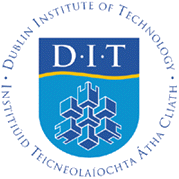
Dublin Institute of Technology was a major third-level institution in Dublin, Ireland. On 1 January 2019 DIT was dissolved and its functions were transferred to the Technological University Dublin, as TU Dublin City Campus. The institution began with the establishment of the first technical education institution in Ireland, in 1887, and progressed through various legal and governance models, culminating in autonomy under a statute of 1992.

The Royal Irish Academy, based in Dublin, is an academic body that promotes study in the sciences, humanities and social sciences. It is Ireland's premier learned society and one of its leading cultural institutions. The Academy was established in 1785 and granted a royal charter in 1786. As of 2019, the RIA has around 600 members, regular members being Irish residents elected in recognition of their academic achievements, and Honorary Members similarly qualified but based abroad; a small number of members are elected in recognition of non-academic contributions to society.

The National Museum of Ireland is Ireland's leading museum institution, with a strong emphasis on national and some international archaeology, Irish history, Irish art, culture, and natural history. It has three branches in Dublin, the archaeology and natural history museums adjacent on Kildare Street and Merrion Square, and a newer Decorative Arts and History branch at the former Collins Barracks, and the Country Life museum in County Mayo.
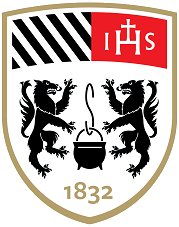
Belvedere College S.J. is a fee-paying voluntary secondary school for boys in Dublin, Ireland.

The National Library of Ireland is Ireland's national library located in Dublin, in a building designed by Thomas Newenham Deane. The mission of the National Library of Ireland is "To collect, preserve, promote and make accessible the documentary and intellectual record of the life of Ireland and to contribute to the provision of access to the larger universe of recorded knowledge."
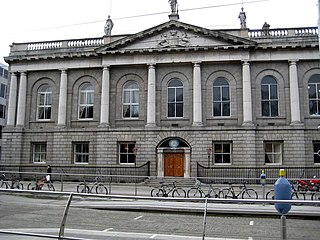
The Royal College of Surgeons in Ireland (RCSI) is a not-for-profit medical professional and educational institution, which is also known as RCSI University of Medicine and Health Sciences. It was established in 1784 as the national body for the surgical branch of medicine in Ireland, with a role in supervision of training, and as of 2021 provides a broad range of medical education in multiple countries.
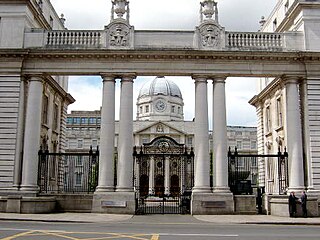
The Royal College of Science for Ireland (RCScI) was an institute for higher education in Dublin which existed from 1867 to 1926, specialising in physical sciences and applied science. It was originally based on St. Stephen's Green, moving in 1911 to a purpose-built "Royal College of Science" building on Merrion Street, now known as Government Buildings. In 1926 it was absorbed into University College Dublin (UCD) as the faculty of Science and Engineering.
Diarmaid Ferriter is an Irish historian, broadcaster, and university professor. He has written fourteen books on the subject of Irish history, and co-authored another. Ferriter attended St. Benildus College in Kilmacud in Dublin and University College Dublin.
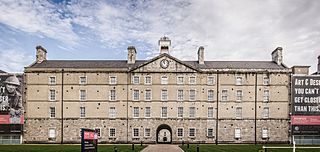
The National Museum of Ireland – Decorative Arts and History is a branch of the National Museum of Ireland (NMI) located at the former Collins Barracks in the Arbour Hill area of Dublin, Ireland.

The Local Government Reform Act 2014 is an act of the Oireachtas which provided for a major restructuring of local government in Ireland with effect from the 2014 local elections. It merged some first-tier county and city councils, abolished all second-tier town and borough councils, and created a new second tier of municipal districts covering rural as well as urban areas. It also provided for a plebiscite on whether to create a directly elected executive Mayor of the Dublin Metropolitan Area although this provision was not activated. The act was introduced as a bill on 15 October 2013 by Phil Hogan, the Minister for the Environment, Community and Local Government, and signed into law on 27 January 2014 by President Michael D. Higgins. Most of its provisions came into force on 1 June 2014.




















